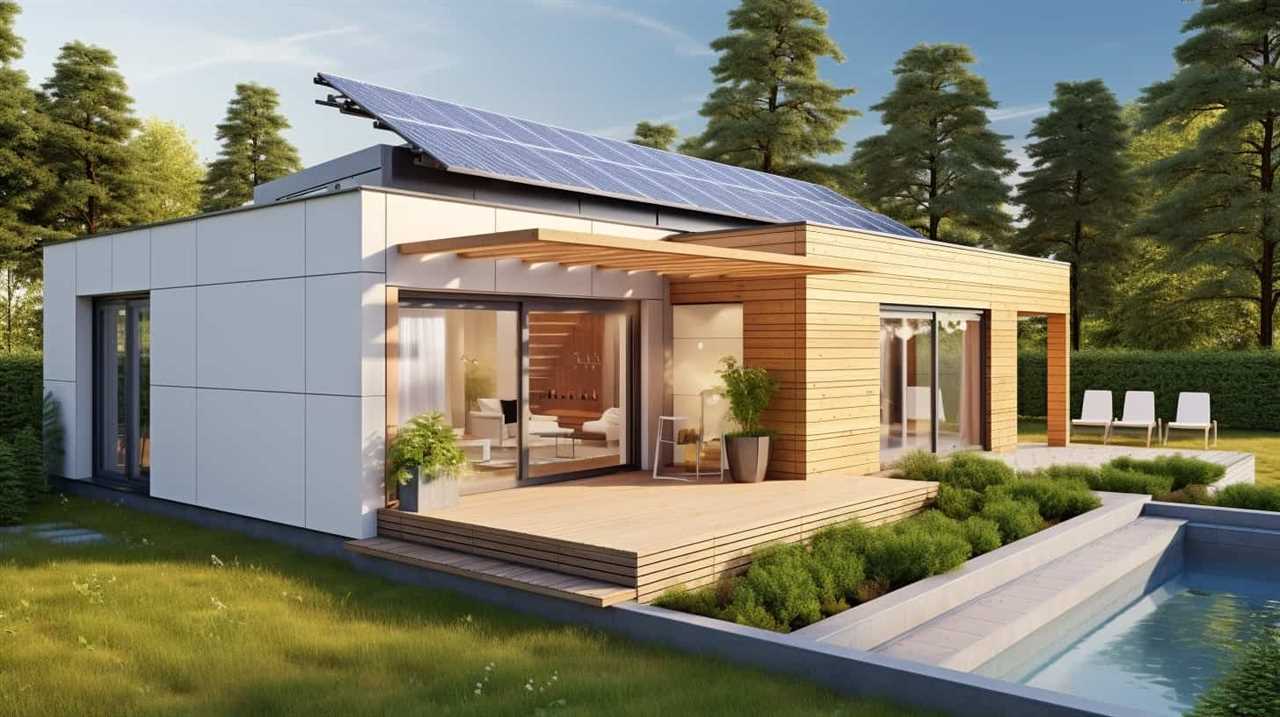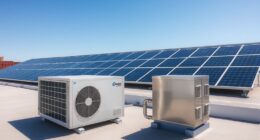At our organization, we recognize the critical importance of effective climate control solutions. This is why we are excited to present to you the remarkable technology provided by heat pumps.
With their ability to provide both heating and cooling, heat pumps are revolutionizing the way we regulate indoor temperatures.
In this article, we will delve into the inner workings of heat pump technology, explore their benefits, and discuss their common applications.
Join us as we uncover how heat pumps are reshaping the future of climate control.

Key Takeaways
- Heat pumps transfer heat using a small amount of energy and operate based on the principle of thermodynamics.
- Heat pumps provide both heating and cooling capabilities by absorbing heat from the surrounding air or ground.
- Heat pumps are energy efficient, reduce energy consumption, and lower utility costs.
- Heat pumps have a positive environmental impact, reduce carbon footprint, and contribute to a cleaner future.
How Does Heat Pump Technology Work
Let’s explore how heat pump technology works to efficiently heat and cool spaces.
Heat pumps are highly efficient devices that use a small amount of energy to transfer heat from one place to another. They operate based on the principle of thermodynamics, utilizing a refrigerant to absorb heat from the surrounding air or ground and transfer it indoors or outdoors, depending on the desired temperature.
The operation of heat pumps involves a cycle of compression, condensation, expansion, and evaporation. The refrigerant is compressed, which causes it to release heat energy. It then condenses into a liquid, releasing even more heat. The liquid refrigerant then expands, absorbing heat from the surrounding air or ground, and finally evaporates, absorbing more heat.
This cycle allows heat pumps to efficiently provide both heating and cooling, making them a sustainable and cost-effective solution for climate control.
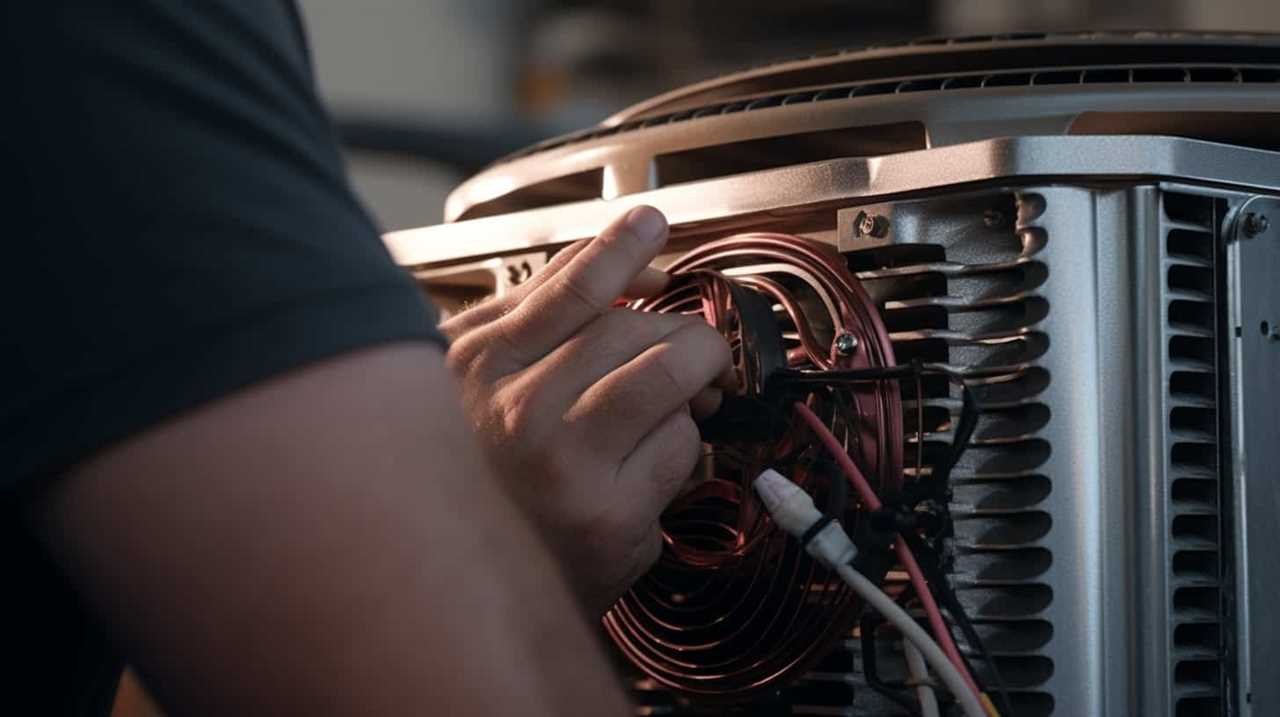
Benefits of Using Heat Pump Technology for Climate Control
When it comes to climate control, heat pump technology offers several benefits.
One of the main advantages is its energy efficiency, as heat pumps can produce more heat or cooling energy than the electrical energy they consume. This not only helps to reduce energy consumption but also lowers utility costs.
Additionally, heat pumps provide a year-round comfort solution, as they can both heat and cool spaces, making them versatile and effective in maintaining a comfortable indoor environment.
Energy Efficiency Advantages
We can maximize energy efficiency by using heat pump technology for climate control. Heat pumps offer several advantages in terms of energy efficiency, making them a cost-effective and environmentally friendly solution for heating and cooling. Here are three key benefits:
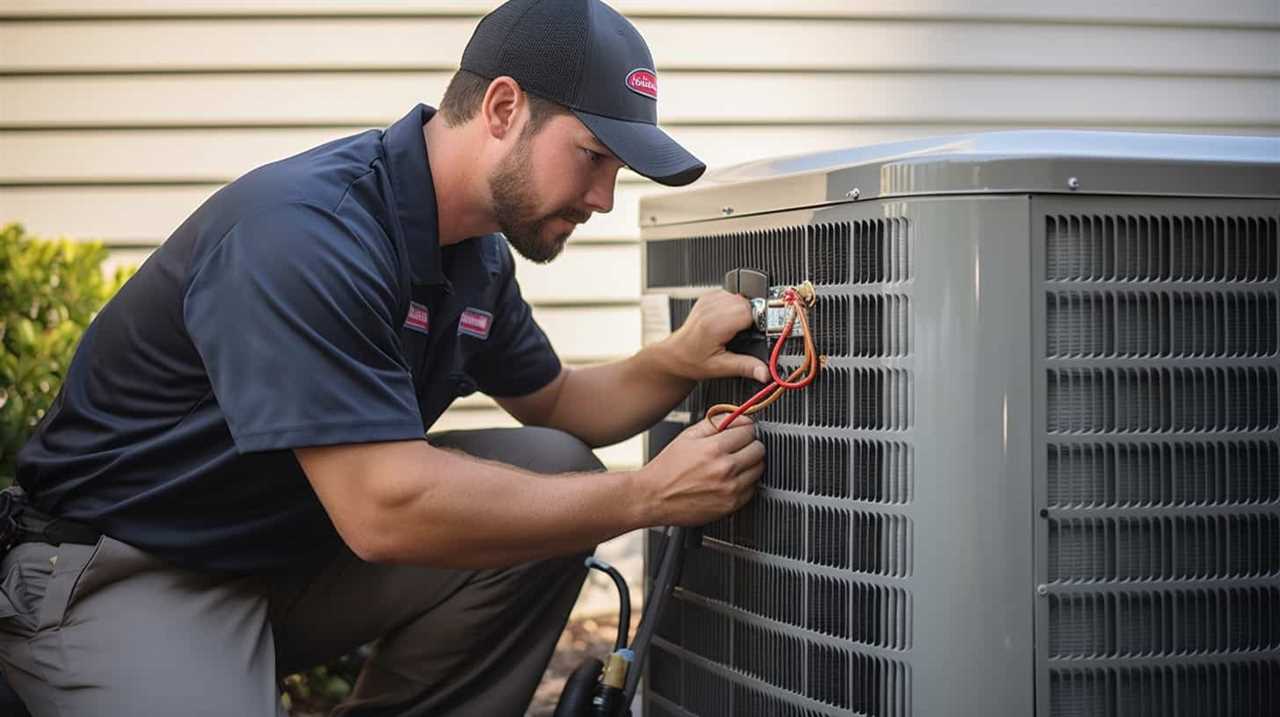
Lower energy consumption: Heat pumps transfer heat from one location to another, rather than generating heat from scratch. This means they require less energy compared to traditional heating and cooling systems, resulting in lower utility bills.
Reduced environmental impact: Heat pumps use electricity to operate, rather than burning fossil fuels. This reduces greenhouse gas emissions and helps combat climate change. By switching to heat pump technology, we can contribute to a more sustainable future.
Energy savings in all seasons: Heat pumps can provide both heating and cooling, making them versatile and efficient all year round. They can extract heat from the air, ground, or water, depending on the type of heat pump, providing consistent comfort while minimizing energy consumption.
Cost Savings Potential
By regularly utilizing heat pump technology for climate control, we can significantly reduce our energy costs and increase our savings. Heat pumps are highly efficient devices that transfer heat from one place to another, allowing us to heat or cool our homes or buildings with minimal energy consumption.

When it comes to cost analysis, heat pumps have a clear advantage over traditional heating and cooling systems. They typically have lower operating costs due to their high energy efficiency, which translates to significant long-term savings on energy bills.
Additionally, heat pumps have a positive environmental impact. By using them instead of fossil fuel-based systems, we can reduce our carbon footprint and contribute to a cleaner and more sustainable future.
Year-Round Comfort Solution
With its ability to provide both heating and cooling, heat pump technology offers a year-round comfort solution for our climate control needs. Here are three benefits of using heat pump technology for year-round comfort:
Energy Efficiency: Heat pumps are known for their energy efficiency, as they transfer heat rather than generate it. This means that they consume less energy compared to traditional heating and cooling systems, resulting in lower utility bills.
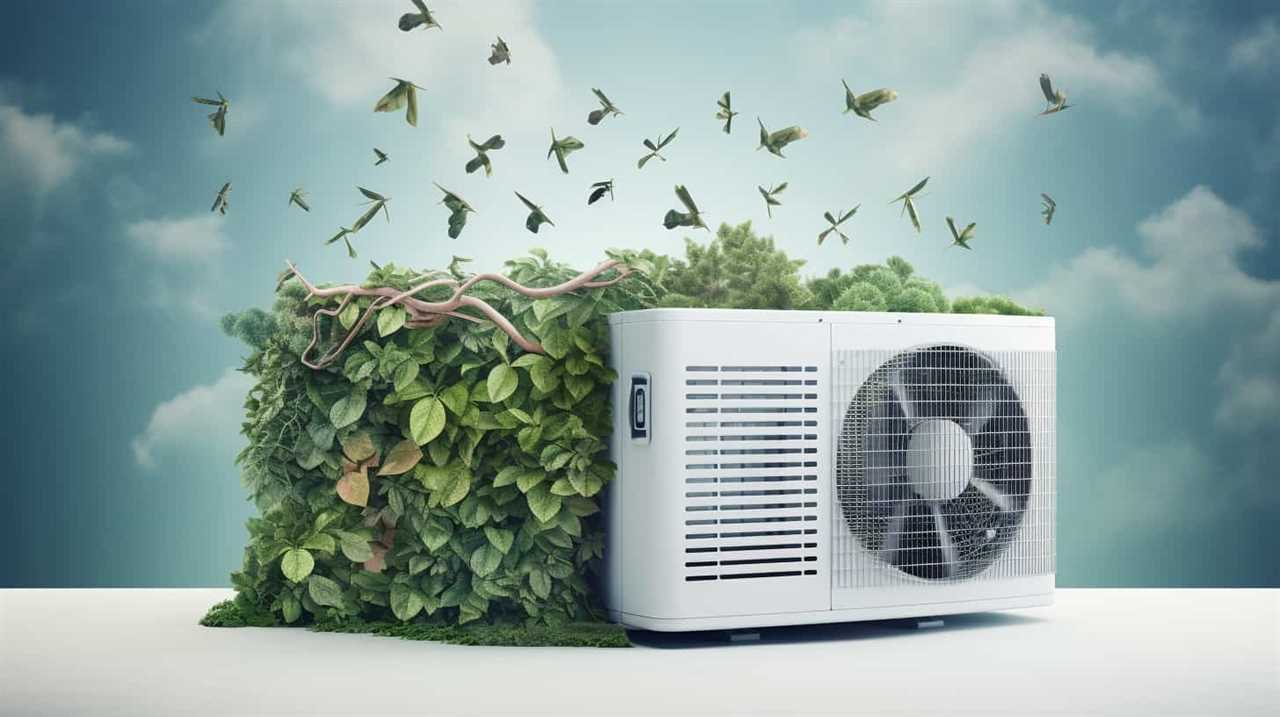
Consistent Comfort: Heat pumps provide consistent and even heating and cooling throughout the year. They’re designed to maintain a constant temperature, ensuring a comfortable indoor environment regardless of the weather outside.
Versatility: Heat pumps can operate in various climates, making them suitable for different regions. They can be used for both residential and commercial purposes, providing year-round comfort in homes, offices, and other buildings.
Understanding the Role of Heat Pumps in Climate Control Systems
When it comes to climate control systems, understanding the role of heat pumps is essential.
Heat pumps are known for their energy efficiency, making them a popular choice for heating and cooling applications. By utilizing the principles of thermodynamics, heat pumps transfer heat from one place to another, providing both heating and cooling capabilities.

This not only reduces energy consumption but also offers significant benefits in terms of cost savings and environmental impact.
Energy Efficiency of Heat Pumps
We can assess the energy efficiency of heat pumps by measuring their performance in climate control systems. Evaluating the cost effectiveness and environmental impact of heat pumps is important for both individuals and businesses.
Here are three key factors to consider when assessing the energy efficiency of heat pumps:
Coefficient of Performance (COP): This metric measures the ratio of heat output to electrical input. A higher COP indicates greater efficiency, as the heat pump is able to produce more heat for the same amount of electricity.
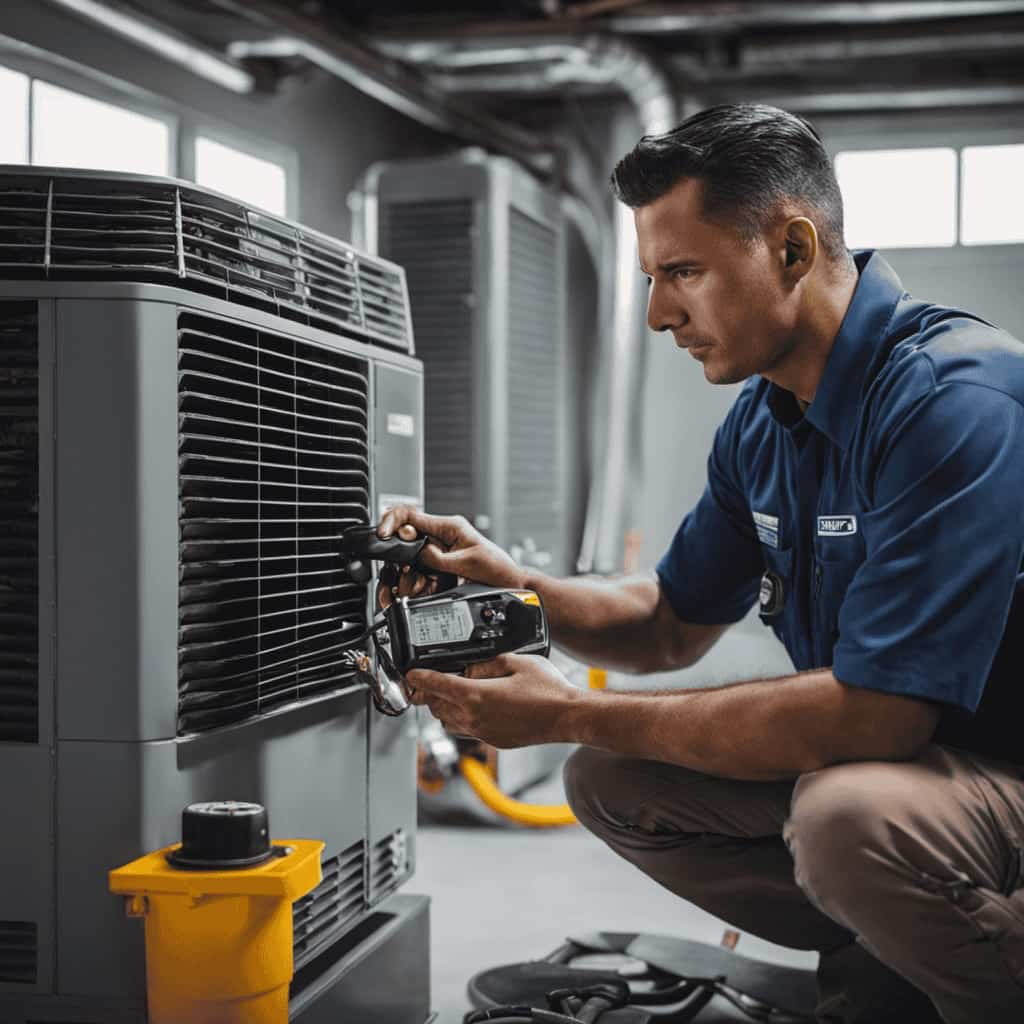
Seasonal Energy Efficiency Ratio (SEER): SEER measures the cooling efficiency of the heat pump during the entire cooling season. A higher SEER rating signifies better energy efficiency.
Heating Seasonal Performance Factor (HSPF): HSPF measures the heating efficiency of the heat pump during the entire heating season. A higher HSPF indicates better energy efficiency and cost savings.
Benefits of Heat Pumps
We can experience numerous benefits by incorporating heat pumps into our climate control systems, as they play a crucial role in maintaining a comfortable indoor environment while minimizing energy consumption. Heat pumps offer a versatile solution for both residential heating options and energy efficient cooling systems.
One of the main advantages of heat pumps is their high energy efficiency. Unlike traditional heating and cooling systems, heat pumps transfer heat from the outside air or ground into the indoor space, instead of generating heat by burning fuel. This results in significant energy savings and reduced utility bills.
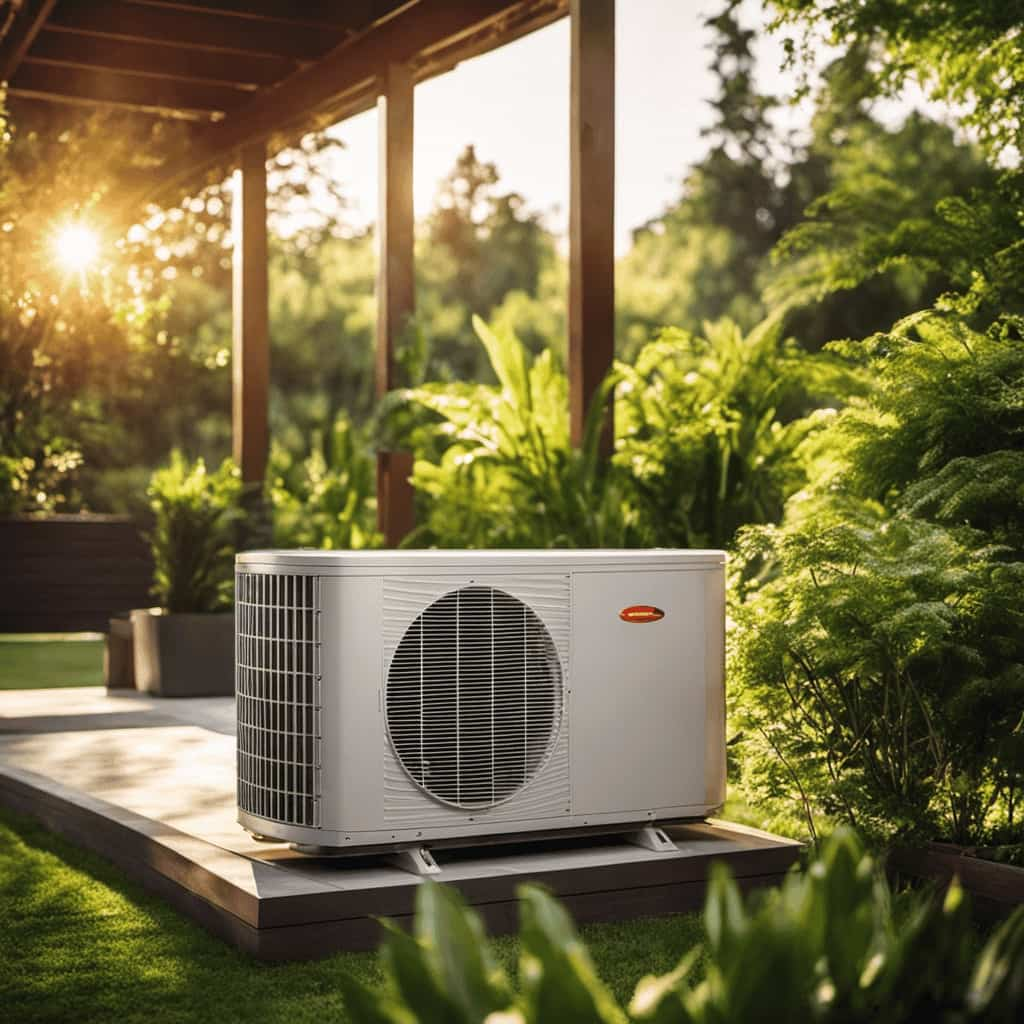
Additionally, heat pumps provide consistent heating and cooling throughout the year, ensuring a comfortable living environment regardless of the outside temperature. With their ability to provide both heating and cooling functions, heat pumps offer a cost-effective and environmentally friendly solution for climate control.
In the next section, we’ll explore the different types of heat pumps used in climate control systems.
Types of Heat Pumps Used in Climate Control
There are several types of heat pumps that we use in climate control. These include:
- Residential vs Commercial Heat Pumps:
- Residential heat pumps are designed for single-family homes and small-scale applications, providing efficient heating and cooling solutions.
- Commercial heat pumps, on the other hand, are designed for larger buildings and commercial spaces, offering higher capacity and greater efficiency.
- Geothermal Heat Pumps:
- Geothermal heat pumps utilize the constant temperature of the earth to provide heating and cooling.
- They extract heat from the ground during the winter and transfer heat into the ground during the summer, making them highly efficient and environmentally friendly.
- Air-Source Heat Pumps:
- Air-source heat pumps extract heat from the outside air and transfer it inside during the winter, and vice versa during the summer.
- They’re versatile and can be used in both residential and commercial applications.
Understanding the different types of heat pumps used in climate control is essential for choosing the right system for your needs. Now, let’s explore the efficiency and energy savings that heat pump technology can offer.
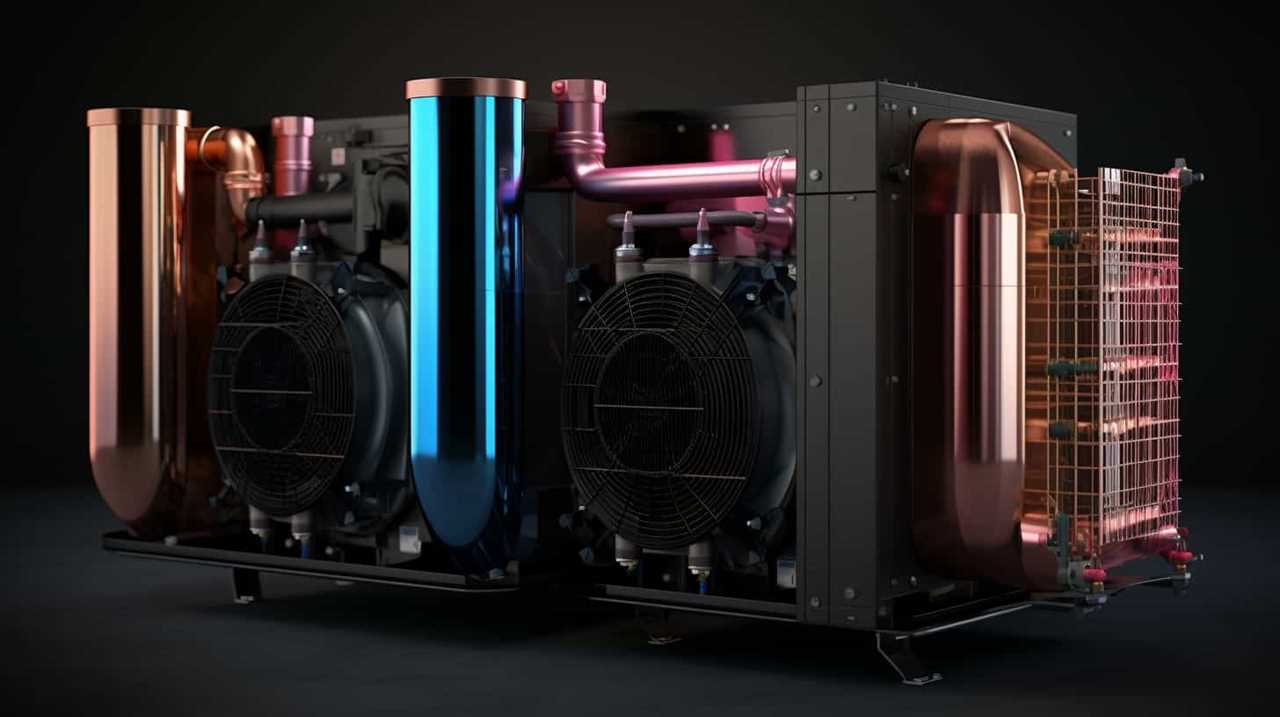
Efficiency and Energy Savings With Heat Pump Technology
One of the key benefits of heat pump technology is its ability to provide efficient heating and cooling, resulting in significant energy savings. Heat pumps are designed to move heat from one place to another, rather than generating heat like traditional heating systems. This process makes them highly energy-efficient, as they require less electricity to operate compared to other heating and cooling methods.
The cost effectiveness of heat pump technology is evident in the long-term savings it offers. By reducing energy consumption, homeowners can expect lower utility bills and a reduced environmental impact. Heat pumps also have a minimal carbon footprint, as they don’t burn fossil fuels to produce heat.
Factors to Consider When Choosing a Heat Pump for Climate Control
When choosing a heat pump for climate control, it’s important to assess its efficiency and consider its compatibility with your existing HVAC system. To make an informed decision, here are three factors to consider:
Efficiency: Look for a heat pump with a high Seasonal Energy Efficiency Ratio (SEER) and Heating Seasonal Performance Factor (HSPF) ratings. These ratings indicate how efficiently the heat pump operates, resulting in energy savings and lower utility bills.
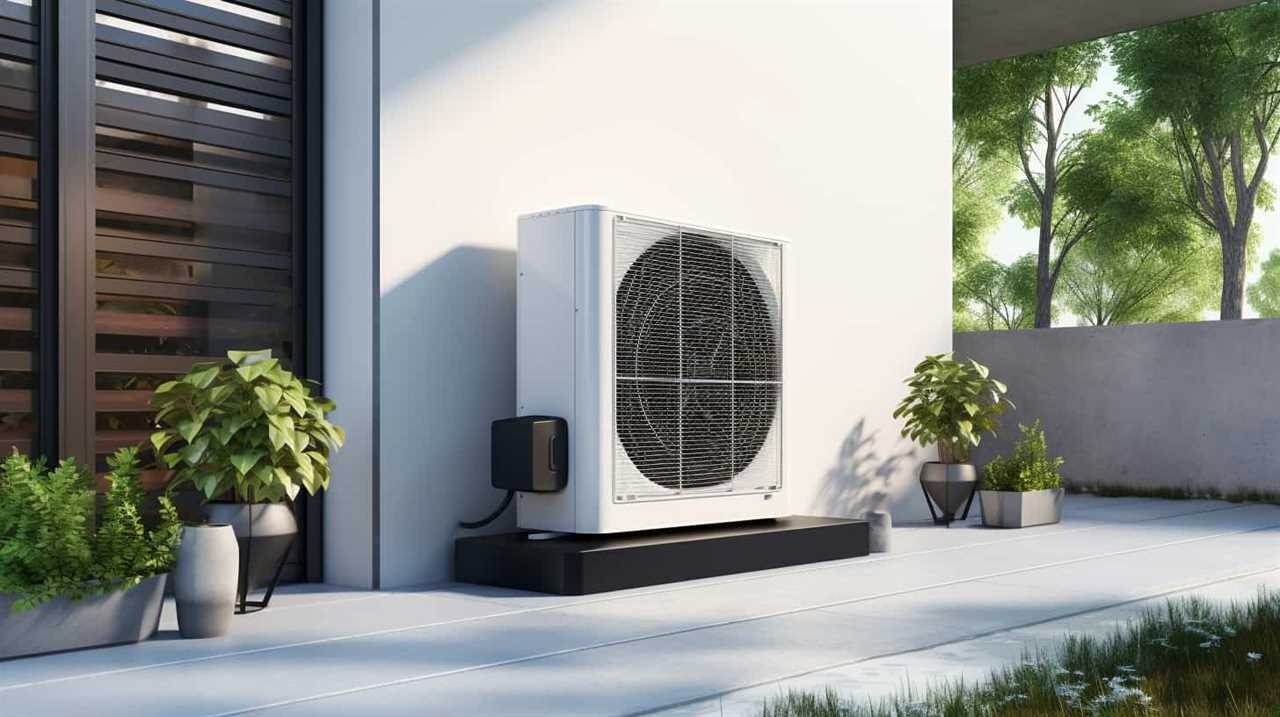
Compatibility: Ensure that the heat pump you choose is compatible with your existing HVAC system. This will ensure seamless integration and optimal performance.
Environmental Impact: Consider the environmental impact of the heat pump. Look for models with eco-friendly refrigerants and energy-efficient features to minimize greenhouse gas emissions and reduce your carbon footprint.
Common Applications of Heat Pump Technology in Climate Control
When it comes to common applications of heat pump technology in climate control, residential heating options and energy-efficient cooling systems are at the forefront.
Heat pumps offer an effective and efficient way to heat homes during colder months, providing warmth and comfort.
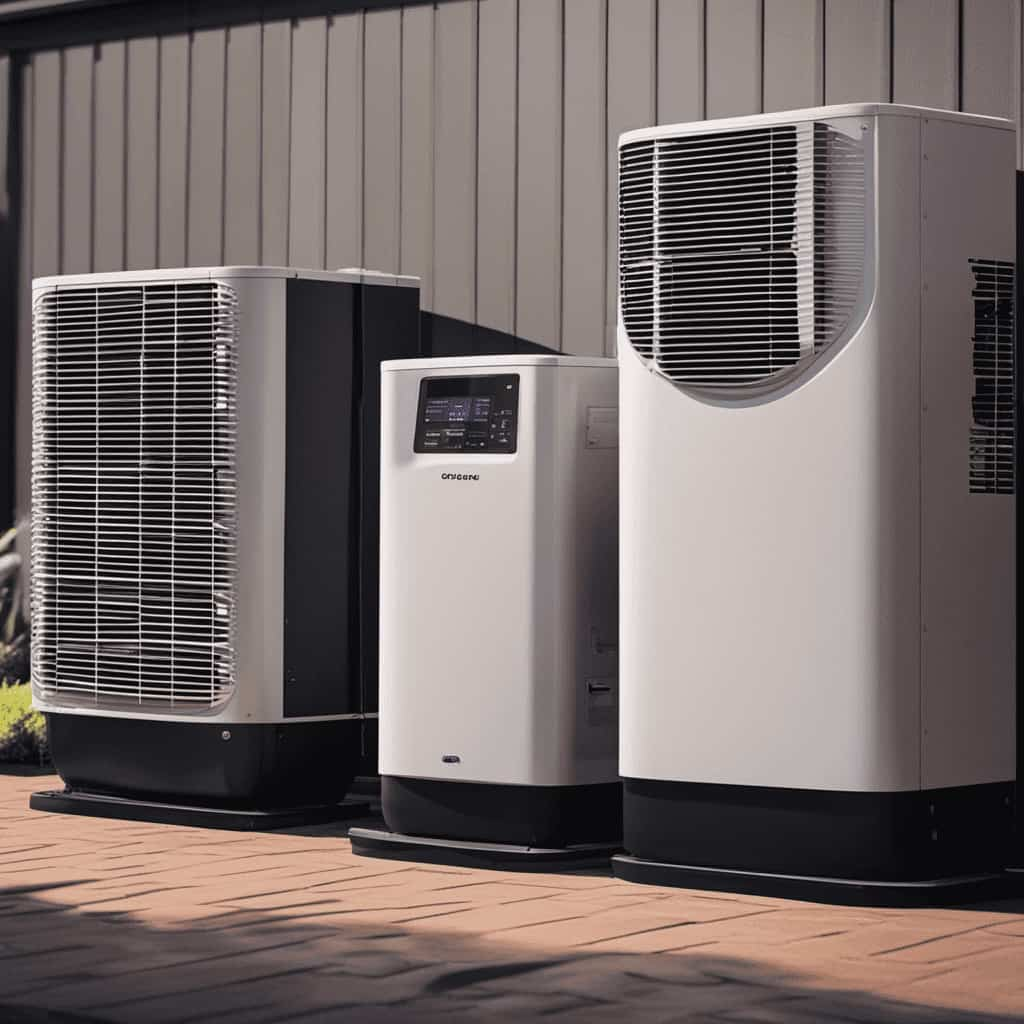
Additionally, heat pumps can also be used as cooling systems, offering energy-efficient alternatives to traditional air conditioners.
Residential Heating Options
We often choose heat pump technology for residential heating due to its efficient and cost-effective operation. Here are three common applications of heat pump technology in residential heating:
Air-to-air heat pumps: These heat pumps extract heat from the outside air and transfer it indoors to heat the living space. They’re a popular choice due to their affordability and versatility.
Geothermal heat pumps: These heat pumps utilize the stable temperature of the ground to efficiently heat homes. They’re highly efficient and have a minimal environmental impact, making them a great choice for environmentally conscious homeowners.
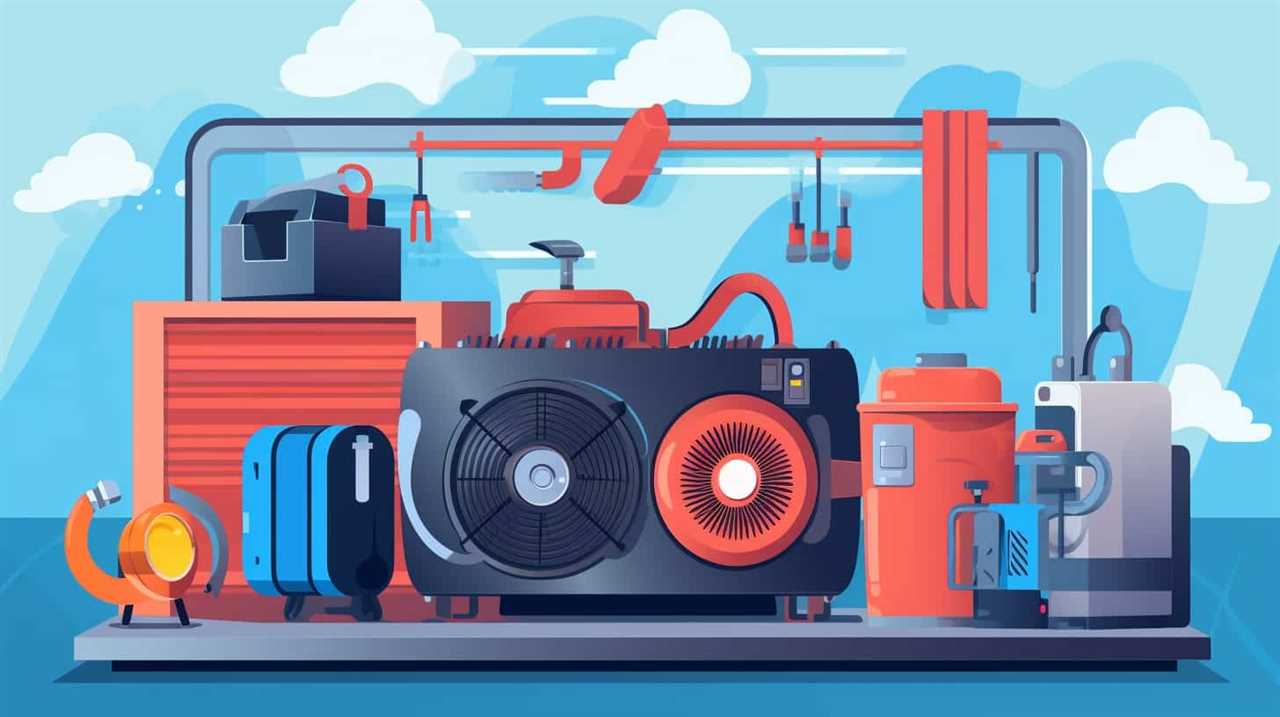
Water source heat pumps: These heat pumps use a water source, such as a lake or well, to extract and transfer heat. They can be used for both heating and cooling purposes and are often chosen for their energy efficiency and reduced operating costs.
Energy-Efficient Cooling Systems
Our team has found that one common application of heat pump technology in climate control is utilizing energy-efficient cooling systems.
Energy efficient cooling systems, such as air conditioners and refrigerators, are designed to remove heat from indoor spaces and transfer it outside, providing a comfortable environment while consuming less energy.
Heat pumps, in particular, offer significant advantages in terms of energy efficiency. Unlike traditional cooling systems that rely on electricity to generate cool air, heat pumps use a refrigeration cycle to transfer heat from the indoor environment to the outdoors. This process allows heat pumps to provide cooling at a fraction of the energy consumption of conventional systems.

Maintenance and Care for Heat Pump Climate Control Systems
Regular maintenance and care of our heat pump climate control systems is essential for optimal performance and longevity. Here are some maintenance tips and a troubleshooting guide to help ensure the smooth operation of your heat pump:
Clean or replace air filters regularly: Dirty filters can restrict airflow and reduce efficiency. Clean or replace them every one to three months.
Check and clean outdoor unit: Remove any debris, leaves, or dirt that may have accumulated around the outdoor unit. Keep the area around the unit clear to ensure proper airflow.
Schedule professional maintenance: Regular maintenance by a qualified technician is crucial. They can inspect and clean the system, check refrigerant levels, and identify any potential issues before they become major problems.
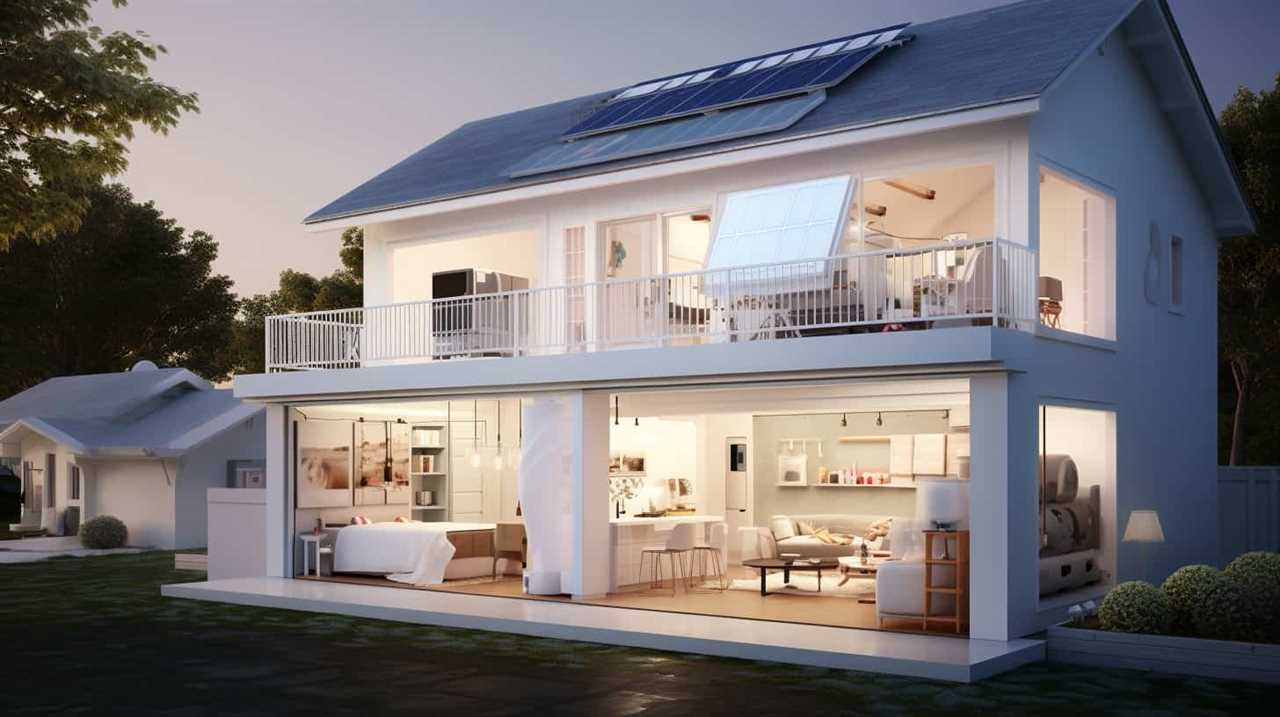
Comparing Heat Pump Technology to Traditional HVAC Systems
Heat pump technology offers several advantages over traditional HVAC systems. One of these advantages is increased energy efficiency and versatility. Heat pumps are able to provide heating and cooling throughout the year, regardless of weather conditions. This sets them apart from solar power, which relies on sunlight availability and may not be as reliable in all climates.
Another advantage of heat pump technology is its impact on indoor air quality. Heat pumps continuously circulate and filter the air, helping to remove pollutants and improve overall indoor air quality. This is particularly beneficial for individuals with respiratory issues or allergies.
Looking towards the future, there are several trends and innovations in heat pump climate control technology. Advancements in energy storage, smart controls, and integration with renewable energy sources like solar power will continue to drive the industry forward.
Future Trends and Innovations in Heat Pump Climate Control Technology
As we explore future trends and innovations in heat pump climate control technology, we can expect advancements in energy efficiency and integration with renewable energy sources. These emerging technologies aim to improve the performance and sustainability of heat pump systems, providing more efficient and environmentally-friendly solutions for climate control.

Here are three key areas where future innovations are expected:
Smart controls and automation: Advanced algorithms and machine learning will enable heat pump systems to optimize their operation based on real-time data, resulting in improved energy efficiency and comfort.
Integration with renewable energy sources: Heat pumps will increasingly be designed to work in conjunction with solar panels, wind turbines, and other renewable energy sources, maximizing the use of clean energy and reducing reliance on fossil fuels.
Enhanced refrigerants and heat transfer fluids: Research and development efforts are focused on developing refrigerants and heat transfer fluids that have lower global warming potential and higher energy efficiency, ensuring a more sustainable and environmentally-friendly operation.
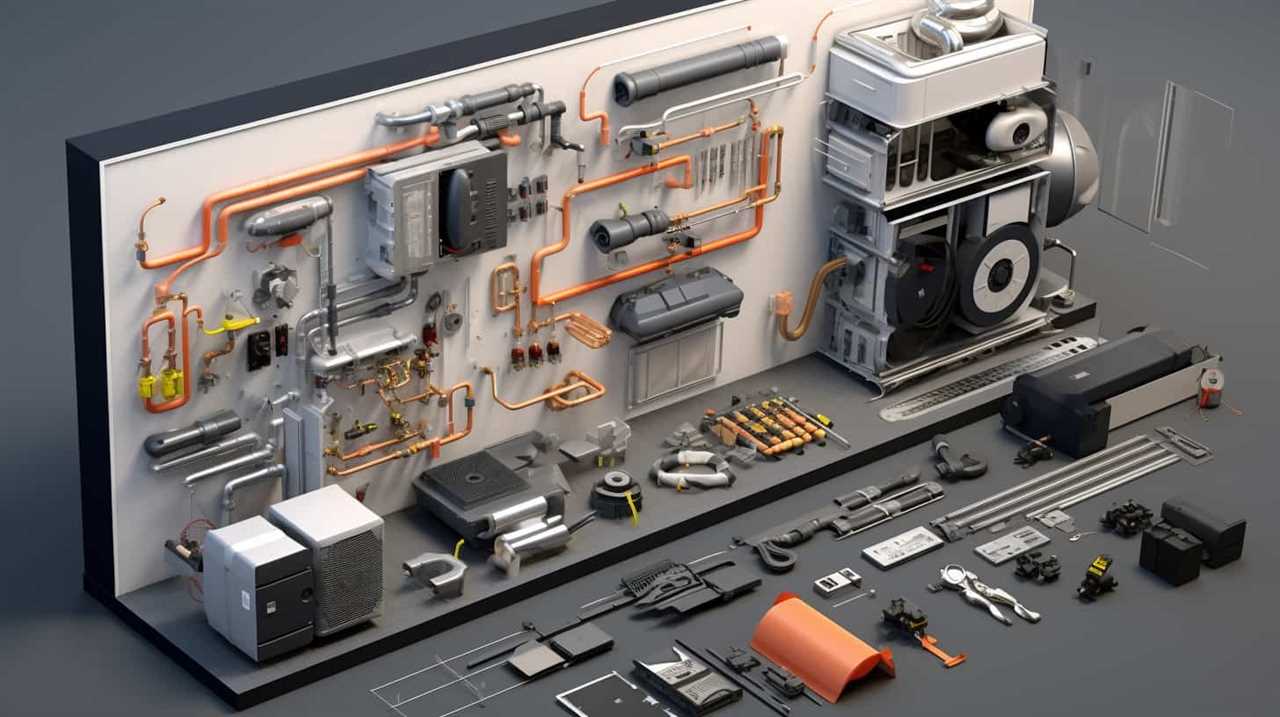
These future innovations hold great promise in revolutionizing the heat pump climate control technology, offering more efficient, sustainable, and cost-effective solutions for serving the needs of individuals and communities.
Frequently Asked Questions
Are Heat Pumps Noisy When Operating?
Heat pumps can be noisy when operating, with noise levels varying depending on the specific model and installation. Excessive noise can impact residential areas, so it’s important to choose a heat pump with low noise levels.
Can Heat Pumps Be Used in All Climate Regions?
Heat pumps can be used in all climate regions, but their efficiency and effectiveness may vary. In colder climates, they may struggle to provide sufficient heating. In warmer climates, they can be highly energy efficient for cooling.
Do Heat Pumps Work During Extreme Temperatures?
Yes, heat pumps can work during extreme temperatures. They use a refrigeration system to transfer heat, allowing them to both cool and heat a space. Compared to traditional HVAC systems, heat pumps save energy.
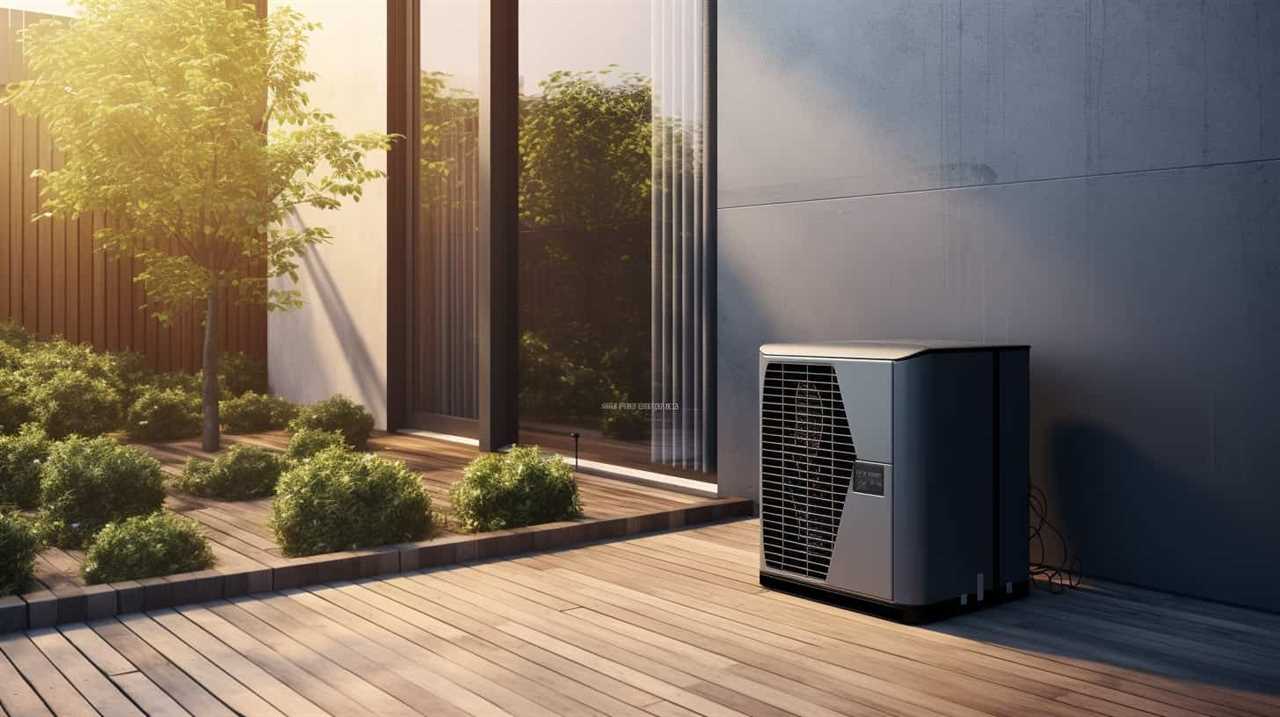
How Long Does a Heat Pump Typically Last?
Heat pumps typically last 15-20 years with regular maintenance. Like a well-oiled machine, they require routine check-ups and filter changes to ensure optimal performance and longevity.
Can Heat Pump Technology Be Integrated With Renewable Energy Sources?
Yes, heat pump technology can be integrated with renewable energy sources. However, there are integration challenges that need to be considered. Despite these challenges, the environmental benefits of combining heat pumps with renewable energy make it a promising solution for climate control.
How Do Heat Pumps Work in a Climate Control System?
Heat pumps are an essential component of a climate control system. They work by transferring heat energy from one place to another, using refrigerant and a compressor. In cooling mode, heat pumps remove heat from indoor air and expel it outside. In heating mode, they extract heat from outdoor air and distribute it indoors. Climate control system heat pumps efficiently maintain desired temperature levels.
Conclusion
In conclusion, heat pump technology in climate control is a game-changer. With its efficient and energy-saving capabilities, heat pumps are revolutionizing the way we regulate temperature. From residential homes to commercial buildings, heat pumps offer a wide range of applications and benefits.
Maintenance and care for these systems are essential to ensure their longevity and optimal performance. When compared to traditional HVAC systems, heat pump technology stands out as a superior choice.

As we look to the future, we can expect even more advancements and innovations in this remarkable field.





